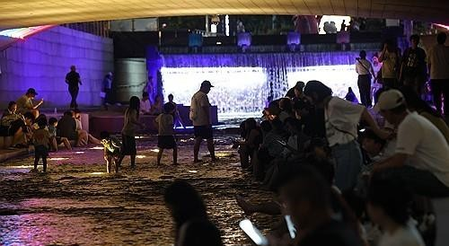

Seoul, Aug 1 (IANS) The number of tropical nights in South Korea’s Seoul in July was tallied at a record high of 23, the state weather service said on Friday, forecasting the daytime high will surge to 37 degrees Celsius in the capital.
Seoul and many other cities nationwide, including Incheon, Cheongju of North Chungcheong Province, Gangneung of Gangwon Province and Seogwipo of the southern Jeju Island, experienced the tropical nights between Thursday and Friday, according to the Korea Meteorological Administration (KMA).
A tropical night refers to a phenomenon when nighttime temperatures stay above 25 degrees Celsius from 6:01 p.m. to 9 a.m. the following day.
Seoul’s 23 tropical nights were the most for any July since modern weather observations began 117 years ago.
Including the tropical nights that occurred in June, the number of tropical nights in Seoul this year is already 25, the fifth most on record, the KMA said, forecasting the ranking is expected to rise as heat waves are likely to continue in August, Yonhap news agency reported.
Earlier on June 30, Seoul experienced its first tropical night of the season, as the capital’s nighttime low was 25.6 degrees Celsius.
Seoul’s tropical night was eight days later than last year’s first tropical night that occurred on June 21, according to the KMA.
South Korea experiences tropical nights due to a combination of factors, including the presence of high-pressure systems, warm and humid air masses, and the urban heat island effect. These factors combine to prevent nighttime temperatures from dropping below 25 degrees Celsius, making it difficult for people to sleep and contributing to heat-related health issues.
Tropical nights can significantly disrupt sleep patterns and increase the risk of heat-related illnesses, particularly among vulnerable populations like the elderly and young children.
This heat streak, described as unprecedented by meteorologists, is not just a weather anomaly but a growing sign of climate shifts impacting many regions globally. The effects of such prolonged heat don’t disappear with the setting sun, as nighttime temperatures fail to offer the body a respite from the intense conditions.
–IANS
int/jk/vd
